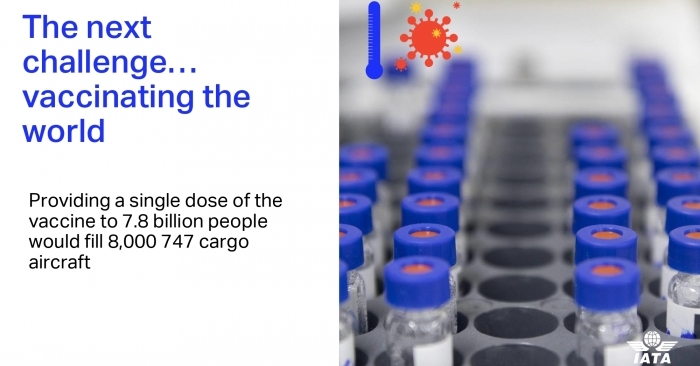IATA urges govts to logistically prepare for Covid-19 vaccine
September 10, 2020: The International Air Transport Association (IATA) urged governments to begin careful planning with industry stakeholders to ensure full preparedness when vaccines for Covid-19 are approved and available for distribution.

September 10, 2020: The International Air Transport Association (IATA) urged governments to begin careful planning with industry stakeholders to ensure full preparedness when vaccines for Covid-19 are approved and available for distribution. The association also warned of potentially severe capacity constraints in transporting vaccines by air.
The potential size of the delivery is enormous. Just providing a single dose to 7.8 billion people would fill 8,000 Boeing 747 cargo aircraft. Land transport will help, especially in developed economies with local manufacturing capacity. But vaccines cannot be delivered globally without the significant use of air cargo.
Henrietta Fore, executive director, United Nations Children's Fund (UNICEF), said, “As the lead agency for the procurement and supply of the COVID vaccine on behalf of the COVAX Facility, UNICEF will be leading what could possibly be the world’s largest and fastest operation ever. The role of airlines and international transport companies will be critical to this endeavour,” said.
Preparedness
Air cargo plays a key role in the distribution of vaccines in normal times through well-established global time- and temperature-sensitive distribution systems. This capability will be crucial to the quick and efficient transport and distribution of Covid-19 vaccines when they are available, and it will not happen without careful planning, led by governments and supported by industry stakeholders.
The world is waiting for a #COVID19 #vaccine
— IATA #ReadyToFly (@IATA) September 9, 2020
Safely delivering these will be the mission of the century for the #aircargo industry. Advance planning between governments & industry needs to happen now.
https://t.co/lKBwq7pBbj @UNICEF @gavi pic.twitter.com/3mIksxTtew
Facilities required
Vaccines must be handled and transported in line with international regulatory requirements, at controlled temperatures and without delay to ensure the quality of the product. While there are still many unknowns (number of doses, temperature sensitivities, manufacturing locations, etc.), it is clear that the scale of activity will be vast, that cold chain facilities will be required and that delivery to every corner of the planet will be needed. Priorities for preparing facilities for this distribution include:
• Availability of temperature-controlled facilities and equipment - maximizing the use or re-purposing of existing infrastructure and minimizing temporary builds
• Availability of staff trained to handle time- and temperature-sensitive vaccines
• Robust monitoring capabilities to ensure the integrity of the vaccines is maintained
Security requirements
Vaccines will be highly valuable commodities. Arrangements must be in place to keep ensure that shipments remain secure from tampering and theft. Processes are in place to keep cargo shipments secure, but the potential volume of vaccine shipments will need early planning to ensure that they are scalable.
Border Processes
Working effectively with health and customs authorities will, therefore, be essential to ensure timely regulatory approvals, adequate security measures, appropriate handling and customs clearance. This could be a particular challenge given that, as part of Covid-19 prevention measures, many governments have put in place measures that increase processing times. Priorities for border processes include:
• Fast-track procedures for overflight and landing permits for operations carrying the Covid-19 vaccine
• Exempting flight crew members from quarantine requirements to ensure cargo supply chains are maintained
• Temporary traffic rights for operations carrying the COVID-19 vaccines where restrictions may apply
• Removing operating hour curfews for flights carrying the vaccine to facilitate the most flexible global network operations
• Granting priority on arrival of those vital shipments to prevent possible temperature excursions due to delays
• Tariff relief to facilitate the movement of the vaccine
Capacity concerns
On top of the transport preparations and coordination needed, governments must also consider the current diminished cargo capacity of the global air transport industry. IATA warned that, with the severe downturn in passenger traffic, airlines have downsized networks and put many aircraft into remote long-term storage. The global route network has been reduced dramatically from the pre-Covid 24,000 city pairs. The WHO, UNICEF and Gavi have already reported severe difficulties in maintaining their planned vaccine programs during the Covid-19 crisis due, in part, to limited air connectivity.



